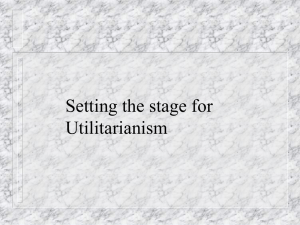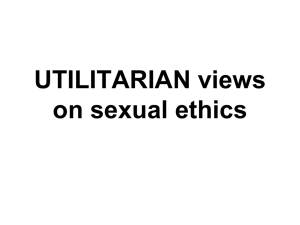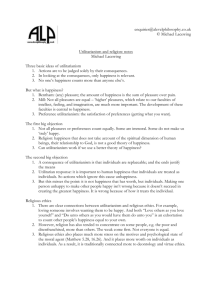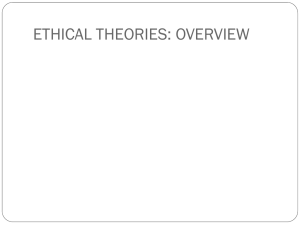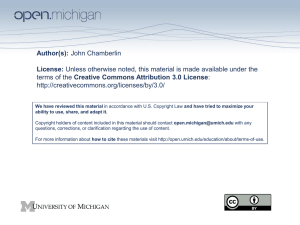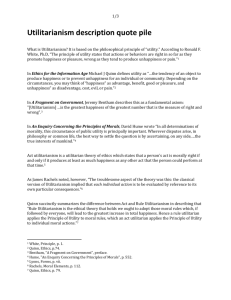Theories of Justice - The Richmond Philosophy Pages
advertisement
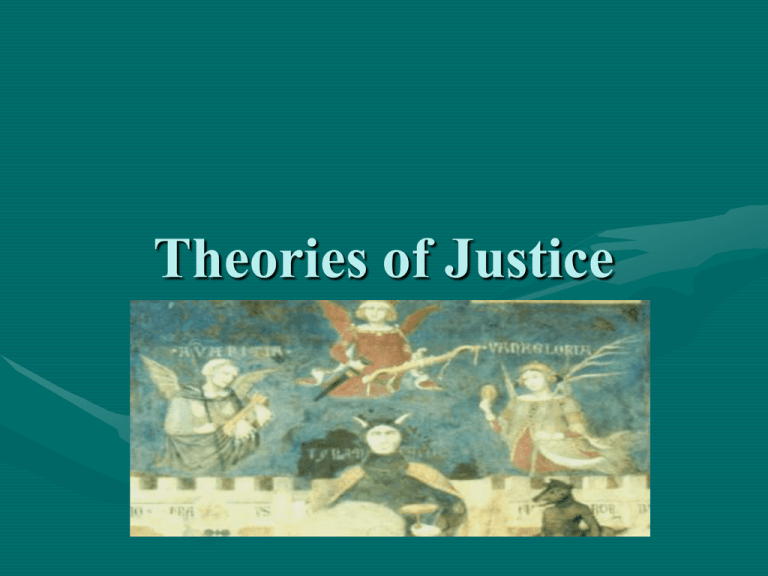
Theories of Justice Justice Some questions: • Why do you think that justice is seen as a centrally important in political philosophy? • Do you think that we should care whether the state is just? • Is justice important, but separable from the existence and role of the state? • What do we mean by justice? • How can a state be just? …why care? Some suggestions. Which do you agree with? • Well, the provision of justice is essential to the very possibility of good governance. • Without justice our communal life together lacks the stability of expectation and reciprocity. Life becomes uncertain and precarious. The problem of how to deal with conflicting interests. • ‘Justice removed, then, what are kingdoms but great bands of robbers’ (Augustine). • A just state is one in which the citizens are happier than in any other. • Justice is necessary if one’s rights are to be respected. What do we mean? Two applications of the concept of justice identified by Aristotle. • Commutative – question of justice arises when someone deserves something through his actions whether it be a reward or punishment. • Distributive – question of justice arises when there is some good or resource to be distributed among those with a claim to it. …meaning • ‘Justice is the constant and perpetual will to render to each his due’ (Justinian, Institutes 1.1, 533 A.D.). • So, the primary focus of justice is the individual. • Each person is treated according to the same criterion or standard. Treatment of individuals is non-arbitrary and consistent. • The role of laws and a system or infrastructure for their administration becomes apparent. …meaning • Is consistency sufficient for justice? Think of a reason why not. • It would be consistent to require that all people shorter than 1.70 metres pay a special penalty super-tax. But surely it would not be just. • A more serious example is the kind of consistency characteristic of political and judicial systems which embody systematic discrimination against particular groups or communities. …meaning • Justice requires that the treatment of individuals is appropriate or relevant to what the matter in hand. • If individuals are to be treated differently in a particular circumstance then that difference must be grounded in reasons that are relevant to the matter in hand. • Justice may involve discrimination in the sense that individuals are treated in different ways – but it also requires that the grounds for doing so are relevant to the treatment. …meaning • If I am to be punished or rewarded for acting in a certain way, then the state is picking me out for a different kind of treatment from those who have not acted in such a fashion. • That someone is male, young, black, gay, an asylum seeker or whatever seems on the face of things to be irrelevant as general grounds for determining how they ought to be treated. …meaning • As well as consistency and relevance the idea of justice seems to entail a commitment to • Proportionality • The way in which one is treated should be in line with, in proportion to what one has done or in proportion to whatever relevant feature justifies a difference in treatment. • If Jones’ essay is twice as good as Smith’s which is awarded 30% then Jones should get 60%. …meaning • Justice involves the non-arbitrary, relevant and proportionate treatment of individuals. Justice requires that the individual gets what she deserves. • We can add that for a state to be just it must then regard individuals impartially and with equality. • One way in which this thought can be captured is to say that as bearers of (equal) rights justice demands that the state respect each individual’s rights in its treatment of them. Distributive justice • Distributive justice is concerned with the principles determining the (just) distribution of goods and resources within a society. • If justice is a feature of the institutions and arrangements between individuals within a state, then we can ask what principles (if any) ought to govern the distribution of rights, duties, social and economic goods. Why a theory? • What are the general principles in virtue of which one can judge a society – and the state – to be a just one? • Appeal to the definition of justice not enough. It will not set out what ought to be done in a particular kind of situation. • We need to identify a framework or ground to determine the structure, goals and procedures of the institutions of state so that rights and resources are distributed in a just fashion …theory • Starting point for a theory? • Individuals are equal (and possess rights) • But justice is not just a case of ensuring the same outcome for everyone. Impartiality, relevance and proportionality can lead to different outcomes for different individuals depending on what they have done. In the case of criminal justice the guilty are justly punished while the innocent go free. • Does this apply in the case of distributive or social justice? We’ll see what Marxism has to say on this later in the course. …theory • Outcomes are important but so is procedure. • The way in which the distribution of goods is determined or a decision made is important. • In particular the procedure must be a fair one – that is it must respect the equality and rights of individuals and deal impartially among them. Which theory? • • • • Utilitarian accounts of justice Justice as mutual advantage Justice as fairness – Rawls and A Theory of Justice The Entitlement Theory of Justice – Nozick and Anarchy, State and Utopia • Marx and justice …theory • What would a utilitarian theory of justice be? • Utilitarianism explains morality in terms of an ultimate end - the maximisation of happiness. • At its most basic and in its act-utilitarian form, utilitarianism says that the right action is that which maximises general happiness. • Utilitarianism is impartial: the happiness of each person counts for exactly the same as the happiness of any other. No other feature carries any special weight. It assigns each person equal ranking in the calculation of the overall sum of happiness. • What criticisms does such an approach face? Justice and utility • With just arrangements defined in terms of utility and the outcome of social arrangements it looks like it is going to be legitimate to treat some individuals as means to promoting that end. The classic example – hanging the innocent. Can you think of how utilitarianism might give rise to problems in less extreme cases? • But this conflicts with the notion of individual rights. If justice involves the protection of such rights then utilitarianism cannot explain justice. • Problem persists even if we drop talk of rights. The significance of individual integrity and the first-person perspective ought to be respected by a theory of justice. That this life and commitments are mine impose a limit on what can be demanded of me. That limit defined and protected by a theory of justice. • Question – does an appeal to rule utilitarianism help? Justice as fairness • The single most influential work in 20th century political philosophy – John Rawls, A Theory of Justice. Fairness • How are we to identify those principles which will ensure the fairness of the basic institutions of the state and the procedures through which our lives are conducted and constrained? • For justice simply is the fair distribution of (in Rawls’ terms) the social primary goods. • That is, liberty and opportunity, income and wealth and the bases of self-respect. Fairness and justice • Your task – • By what means can we identify and specify the principles of justice. • To put matters in a very general way. By what procedure can we determine the rules of game so that they will be fair… • …and regarded as fair by the participants. • What ought the principles of justices be? • For example, should income be distributed on the basis of need, good looks, desert? Remember a theory of justice will explain why such a distribution is fair – why the resulting distribution is one of fair shares.
